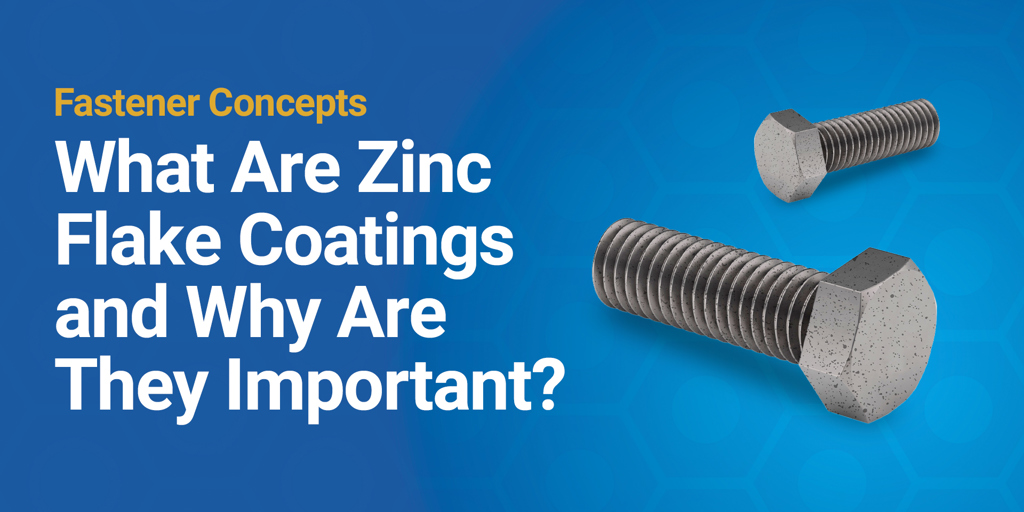
What Are Zinc Flake Coatings and Why Are They Important?
What Are Zinc Flake Coatings and Why Are They Important?
When fasteners are exposed to corrosive environments, the type of finish applied to their base material plays a major role in determining how long they last and how well they perform in their intended application. Whether in automotive manufacturing, marine environments, or heavy equipment, the right finish is essential to preventing corrosion and maintaining long-term performance.
Among the wide variety of finishes used across the fastener industry, zinc flake coatings continue to stand out for their proven performance and corrosion resistance. They're especially valued in applications where traditional electroplated finishes fall short, particularly when used on high-strength steel fasteners that require corrosion protection without the risk of hydrogen embrittlement.
As durability expectations rise across multiple industries, zinc flake coatings offer a reliable solution for protecting fasteners in some of the most demanding environments. But what exactly is a zinc flake coating, and what makes this finish so effective at resisting corrosion?
Zinc Flake Coatings Explained
Zinc flake coatings are non-electrolytic finishes made by suspending zinc and aluminum flakes in a binder. The binder works like an adhesive, holding the metal flakes together and helping them bond to the fastener during application. Once cured, it forms a hard, protective film. Most binders are resins made from either carbon-based materials like synthetic polymers or mineral-based compounds like silicates, depending on the coating’s performance requirements.
The coating is applied using methods such as a dip-spin process, where fasteners are submerged in the coating solution and spun out to remove excess material, or a spray application that evenly covers the surface before curing. Both methods create a thin, uniform layer that protects the fastener without altering its dimensions.
Additionally, because no electricity is involved in either process, zinc flake coatings completely avoid the risk of hydrogen embrittlement. This is a critical advantage for high-strength fasteners like Grade 8, Class 10.9, or Class 12.9, which are more prone to failure if hydrogen becomes trapped in the steel during traditional electroplating.
How Zinc Flake Coatings Resist Corrosion
Zinc flake coatings protect fasteners in two main ways. The first is by barrier protection, where the overlapping zinc and aluminum flakes form a defensive shield that blocks moisture, salts, and chemicals from reaching the steel surface. The second is sacrificial protection, where the zinc corrodes first instead of the steel if the coating is damaged or corrosion begins. This self-sacrificing action slows rust from developing and helps keep the steel intact for a longer period.
While traditional zinc electroplating also provides these protections, zinc flake does it more effectively by creating a denser barrier, offering more zinc for longer-lasting sacrificial protection, while avoiding the risk of hydrogen embrittlement. This dual protection, combined with a thin, uniform finish that preserves thread fit, gives zinc flake coatings their exceptional corrosion resistance.
With these performance advantages, it is easy to see why zinc flake coatings are used across many industries today. However, on spec sheets, drawings, customer prints, or other technical documents, you may not always see the term “zinc flake” called out. Instead, the coating may be referenced by a brand name.
Common Zinc Flake Coating Brand Names
Zinc flake coatings are often sold under several brand names. Depending on the supplier or OEM, you might see them specified as:
• Geomet®
• Magni®
• Delta Protekt®
• Zintek®
• Dacromet® (less common today due to hexavalent chromium content)
While each brand uses its own formulation and application process, all are zinc flake coatings that provide the same fundamental benefits, such as long-lasting corrosion protection, uniform coverage, and no risk of hydrogen embrittlement.
Why They Matter
Zinc flake coatings matter because they solve several challenges that other finishes cannot. They provide strong corrosion resistance while avoiding hydrogen embrittlement, which makes them especially well-suited for high-strength fasteners. At the same time, their thin, uniform coating preserves thread fit so parts fit together as intended, without the concern of thread interference from an excessive coating thickness. These qualities make zinc flake coatings a dependable finish for fasteners used in demanding environments like in automotive, marine, and heavy equipment applications.
For anyone reading prints, drawings, or specifications, knowing that zinc flake coatings can appear under different brand names is equally important. Recognizing these coatings, regardless of how they are called out, helps avoid confusion or costly mistakes and ensures the correct parts are sourced right the first time.
How Earnest Helps
At Earnest Machine, we know customer prints and specifications aren’t always clear about what finish is required. Some may list a brand name, others a performance requirement, and some leave room for interpretation. Our team has the knowledge to sort through these details, match the right coating or equivalent, and make sure the fasteners you source meet your customer’s needs. If you have a question or need support, call us at 800-327-6378 or email [email protected].
